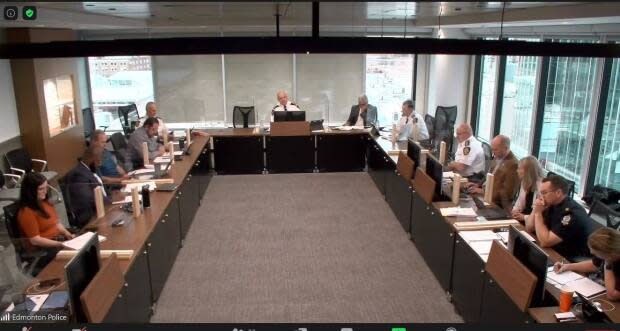Violent crime an ongoing challenge for Edmonton police, chief says
Gun violence, drugs and organized crime continue to be a serious problem in Edmonton, Police Chief Dale McFee says.
At a police commission meeting Thursday, McFee said the Edmonton police Drug and Gang Enforcement Unit, known as EDGE, have their hands full these days.
"That bureau is extremely busy right now with the shootings and the gun violence and the uptake on that," McFee told the commission. "[We're] trying obviously to eliminate some of the threats in this area."
Earlier this month, detectives arrested four people after seizing nearly 570 grams of cocaine, 35 grams of psilocybin and firearms at four addresses in the Haddow, Hazeldean, Walker, and Klarvatten neighbourhoods.
So far this year, Edmonton's had 110 shootings, while the city has averaged 140-150 a year, McFee noted.
"The only city that's higher than us and is five times bigger than us is Toronto, but we disproportionately have the number of guns and shootings."
McFee said the high level of violent crime in Edmonton is also disproportionate to its population of nearly 1 million people.

Coun. Sarah Hamilton, who sits on the police commission, wonders if the violence is getting worse, referencing a recent shooting in the neighbourhood of Lymburn in her ward.
"My office got phone calls from people who live in that area who were terrified because they don't know what that means for them or why."
She said it's "incredibly traumatizing" for people to wake up during the night with lights and sirens outside their windows.
Police reported finding a man lying on the ground outside an apartment complex in that neighbourhood on Oct. 10, who died at the scene.
The update of ongoing violent crime in the city comes a few months after Hamilton asked city officials to take a closer look at the root causes behind the consistent high rate of crime.
She asked administration to study various programs and services that aim to improve safety, including the women's initiative, traffic safety, the anti-racism committee, the plan to end homelessness and mental health initiatives.
In a motion, she asked administration to determine how the city can integrate these programs and align the work.
"I think in trying to create the safest city in Canada you're setting the bar really high," she said. "You're also saying there's gotta be some common ground here, there's gotta be some commonalities that we can work on together to move the needle on this."
New task force
McFee said police continue to commit a lot of resources to incidents that are actually related to mental health and social services.
"A lot of times those won't be crime," McFee said.
"Edmonton has a violence problem, which is a different solution — and a social problem — but if you don't get them both at the same time, there's a good chance the social problem over time could end up in the justice system."
It's one reason city council agreed to form a community safety and well-being task force after a lengthy public hearing on policing earlier this year.
Two professors interviewed by CBC in July criticized the move to create a task force, saying it was redundant because the areas analyzing racism and discrimination have been studied many times before.
Council approved the members for the task force in early October, but they're not yet made the list public.
McFee calls the community safety and well-being task force — where police will work with social agencies and different ethnic groups in communities to come up with strategies to make the city safer — a first of its kind in Canada.
@natashariebe

